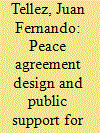|
|
|
Sort Order |
|
|
|
Items / Page
|
|
|
|
|
|
|
| Srl | Item |
| 1 |
ID:
185010


|
|
|
|
|
| Summary/Abstract |
It is common for combatants to deliberately force civilians to flee their homes, resulting in incalculable loss for millions around the world. Existing accounts suggest combatants displace civilians whom they suspect are loyal to their opponents. And yet violence is also frequently motivated by local actors taking advantage of war to pursue private interests unrelated to wartime loyalties. However, little evidence exists of these dynamics with respect to displacement. Drawing on theories of opportunistic violence, I test an account in which surges in demand for land create incentives for elites to prey on peasants for their land. Combining new municipal and survey data from the Colombian armed conflict, I find evidence that the expansion of a land-intensive industry—African palm oil—precipitated opportunistic displacement by elites and paramilitary allies. The results demonstrate how elites can take advantage of war to engage in private accumulation and have implications for transitional justice policy.
|
|
|
|
|
|
|
|
|
|
|
|
|
|
|
|
| 2 |
ID:
173636


|
|
|
|
|
| Summary/Abstract |
Day-to-day policing represents a fundamental interface between citizens and states. Yet even in the most capable states, local policing varies enormously from one community to the next. The authors seek to understand this variation and in doing so make three contributions: First, they conceptualize communities and individuals as networks more or less capable of demanding high-quality policing. Second, they present original survey data and semistructured interviews on local policing from over one hundred sixty slums, eight thousand households, and one hundred seventy informal neighborhood leaders in India that contribute to the nascent empirical work on comparative policing and order. Third, they find evidence that well-connected individuals and densely connected neighborhoods express greater confidence in and satisfaction with local policing. Critically, these differences do not appear to be a function of a lower propensity for local conflict but rather of an increased capacity to leverage neighborhood leaders to mediate relations with the police. The combination of analytics and empirics in this article provides insight into the conditions under which individuals and communities experience the police as expropriators of rents or neutral providers of order.
|
|
|
|
|
|
|
|
|
|
|
|
|
|
|
|
| 3 |
ID:
169002


|
|
|
|
|
| Summary/Abstract |
Conflict negotiations are often met with backlash in the public sphere. A substantial literature has explored why civilians support or oppose peace agreements in general. Yet, the terms underlying peace agreements are often absent in this literature, even though (a) settlement negotiators must craft agreement provisions covering a host of issues that are complex, multidimensional, and vary across conflicts, and (b) civilian support is likely to vary depending on what peace agreements look like. As a result, we know much less about how settlement design molds overall public response, which settlement provisions are more or less controversial, or what citizens prioritize in conflict termination. In this article, I identify four key types of peace agreement provisions and derive expectations for how they might shape civilian attitudes toward conflict termination. Using novel conjoint experiments fielded during the Colombian peace process, I find evidence that citizens evaluate agreements based primarily on how provisions mete out justice to out-group combatants, and further that transitional justice provisions produced sharp divisions among urban voters in the 2016 referendum. Additional analysis suggests that material, distributive concerns were particularly salient for rural citizens. The results have implications for understanding the challenge of generating public buy-in for conflict termination and sheds light on the polarizing Colombian peace process.
|
|
|
|
|
|
|
|
|
|
|
|
|
|
|
|
| 4 |
ID:
165265


|
|
|
|
|
| Summary/Abstract |
Life on the frontlines of a civil war is markedly different from life in safe(r) areas. How does this drastic difference in lived experience shape civilian attitudes toward war and peace? Contrary to theories that link conflict exposure to intransigence, I argue that under certain conditions, exposure increases support for both peace as an outcome and the granting of concessions to armed actors who render settlement more likely. I use various model specifications and matching methodology on survey data from the Colombian peace process, finding strong evidence that civilians in conflict zones exhibit greater support for the peace process overall and are more willing to grant political concessions to armed groups. Mixed evidence further suggests that exposed civilians are less willing to reintegrate with demobilized fighters. The study has theoretical implications for accounts of conflict exposure and helps explain regional variation in the failed referendum vote in Colombia.
|
|
|
|
|
|
|
|
|
|
|
|
|
|
|
|
|
|
|
|
|